#early modern queer history
Explore tagged Tumblr posts
Text
Here and Queer!
In the beginning, God made Adam and Steve.

I've been wanting to create a blog like this for some time now, but just never got enough motivation to bring myself to do it. Look at me now! The main thing I want to go over with this first post, is to establish who I am and what my intentions and goals are with this blog.
Introductions first. My name is Sam. I am a 20 year old queer and trans individual living in the United States. I am currently majoring in history in undergrad. History is one of my greatest passions and loves in my life. Since my 8th grade Washington D.C. trip (and y'know.. the hit 2015 musical Hamilton), I have had this ever grow, ever evolving love for history. As such an admirer of history and the absolute biggest fruitcake, it's no surprise my ass is extremely interested in queer history, specifically of the early modern era.
So, what will be my intentions and goals with this blog? In simple terms, to research and write about LGBTQ+ people, events, laws, etc. from the early modern era (around 1500s-1800s about) throughout world history. This blog won't be very academic so please do not cite me in your university paper or something! This will just be a fun way to practice my research and writing skills and to hopefully educate people on very important queer history!
I do not plan on having scheduled posts as I am a college student and working, so my life is very busy and I won't be able to research and write as much as I'd like. Majority of the research I will be doing for my writings will be online, via the internet of my university's digital library. I will hopefully make a master post for favorite sites and sources in the future.
I will be essentially writing about whatever piques my interest at the time, but I am full open to asks and submissions if there is a person or event or whatever you would like me to research more on.
Thank you so much and I cannot to spread so much queer joy and educations!
#queer history#18th century queer history#early modern#early modern queer history#history#trans history#lesbian history#1700s queer history#world history#queer#gay history#LGBTQ history#queer culture#transgender history
5 notes
·
View notes
Text
Time Travel Question 56: Early Modernish and Earlier
These Questions are the result of suggestions a the previous iteration. This category may include suggestions made too late to fall into the correct earlier time grouping. In some cases a culture lasted a really long time and I grouped them by whether it was likely the later or earlier grouping made the most sense with the information I had.
Please add new suggestions below if you have them for future consideration. All cultures and time periods welcome.
#Time Travel#Early Modern#Queer History#18th century#English History#Mosquitia#Honduran History#Indigenous History#Central American History
15 notes
·
View notes
Text
Celebrating Pride Month 🌈

Marsden Hartley (American, 1877–1943) • Still Life #5 • 1918 • Pastel • Westmoreland Museum of American Art, Greensburg, Pennsylvania, U.S.
#art#painting#fine art#art history#still life#marsden hartley#glbtqia+ artist#pastel painting#queer artist#gay artist#american modernism#american artist#early 20th century american art#pride month 🌈#art of the still life blog#art blogs on tumblr
10 notes
·
View notes
Text
youtube
The Scandalous True History Behind "Mary & George"
I've never seen the show, but I've read quite a bit on this including a very well done book on the poisoning scandal. In other words, this tracks,
#Mary & George#James I#Queer History#George Villiers#James IV#English history#Scottish History#Early Modern#Youtube
9 notes
·
View notes
Text

I particularly like this letter, and the hedging allusions in the final para’.
But also I love all of Marsilio’s writing on love.
“Love has as many forms as there are lovers” what a beautiful line


I also adore this letter too.
“This is plain, because the lover is not content with the sight or touch of the beloved and continually exclaims, ‘I do not know what this man has that sets me on fire, nor do I understand what I desire.’ […]”
just gut wrenching. "nor do I understand what I desire" MARSILIO! </3
Also a great example of Ficino’s difficulty in navigating the physical desires that come with love—or at least his experience of it (and many people’s). He wants that pure, spiritual Platonic ideal of love but is also terribly human. He is trying to reconcile the reality of the physicality of the human body, which I believe he thinks to be beneficial and beautiful in its own way, with this purely spiritual and mental love that he believes is the ideal of what he should be experiencing.
Very much: I love Giovanni and our souls are united etc but I also want to fuck him and that is Base and Animal and will lower our soul’s mutual assent towards godliness. Which our deep love for each other will allow us to reach, if only we can somehow stop making out.
#oh Marsilio#Marsilio Ficino#and his terrible horrible no good very complex day trying to make his queer love Socially Acceptable#giovanni cavalcanti#over here like: or … we can just make out and worry about souls later?#Marsilio: hnnnnnnng but we could be achieving spiritual perfection through the union of our souls in love!!#early modern florence#early modern italy#Marsilio blogging#history#renaissance#Renaissance Italy#Renaissance Florence
9 notes
·
View notes
Text

Robert Mapplethorpe
Untitled, (Blue Underwear)
1970
#robert mapplethorpe#early work#american artists#american photography#american photographer#collage#queer artist#queer art history#queer art#modern art#american art#art history#aesthetictumblr#tumblraesthetic#tumblrpic#tumblrpictures#tumblr art#tumblrstyle#artists on tumblr#queer aesthetic#aesthetic
16 notes
·
View notes
Text
On April 1, 2001, Cecil B. Demented was screened at the Night Visions Film Festival.



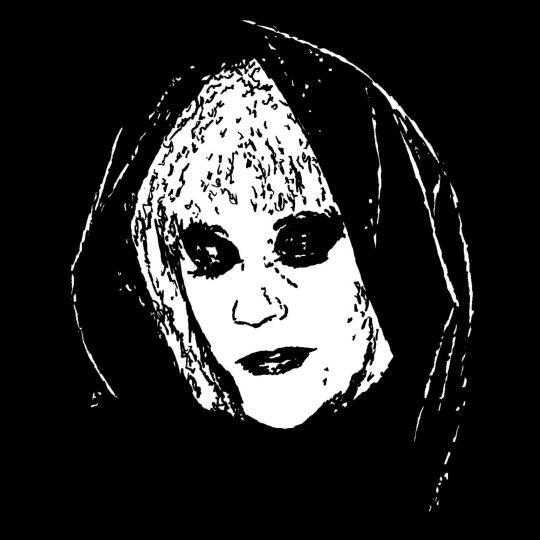





#cecil b. demented#john waters#melanie griffith#stephen dorff#comedy movies#black comedy#satire#queer film#queer cinema#queer artwork#2000s movies#early 2000s#dreamlanders#movie art#art#drawing#movie history#pop art#modern art#pop surrealism#cult movies#portrait#cult film
2 notes
·
View notes
Text
My only sweet and dear child,
Notwithstanding of your desiring me not to write yesterday, yet had I written in the evening if, at my coming out of the park, such a drowsiness had come upon me as I was forced to sit and sleep in my chair half an hour. And yet I cannot content myself without sending you this present, praying God that I may have a joyful and comfortable meeting with you and that we may make at this Christmas a new marriage ever to be kept hereafter; for, God so love me, as I desire only to live in this world for your sake, and that I had rather live banished in any part of the earth with you than live a sorrowful widow's life without you. And so God bless you, my sweet child and wife, and grant that ye may ever be a comfort to your dear dad and husband.
King James VI letter to George Villiers, First Duke of Buckingham - December 1623
James R.
#queer history#queer#lgbtq history#lgbt history#lgbt#early modern#king james vi#king james vi and i#renaissance#queer letters#letters#academia aesthetic#dark academia#academia#queer academia
2 notes
·
View notes
Text
…is it too late to ask to be known everywhere as The Shipwright of Doubtful Gender?

Happy Pride Month from me and the Shipwright of Doubtful Gender!
#queer history#age of sail#nonbinary#trans history#gnc history#we have always been here#early modern history#modern history
2K notes
·
View notes
Text
Hbomberguy did a pretty good job pointing out how Somerton has tried to take up the air of modern queer creators, stealing the works they made to little or no money or exposure, and using them to bolster his own fame. It's a truly reprehensible act.
But I feel like it's also important to briefly touch on what he stole from the past.
The Celluloid Closet is a backbone text on queerness and cinema. Like, if you're at all interested in the subject, please read the book, and watch the doc. Yes, the language will be outdated. It was written in 1981 and the doc published in 1995. Language evolves. I was fortunate enough to both read the book and see the documentary in the early 2000s, when I attended university.
It was written by Vito Russo, who held a Masters in film and a desire to fight for queer rights after witnessing the Stonewell riots. The Celluloid Closet was first a live lecture presentation, then a book. He would try to get the book made into a documentary in the early years, and after he died, others picked up that torch to carry on his work and to pay respect to the man.
Vito Russo was also one of the co-founders of GLAAD. He was a co-founder of ACT UP. You may have, if you've watched documentaries or seen news stories about the AIDS crisis, seen parts of his speech, Why We Fight. He protested, advocated, and educated even as people he knew and loved died, and he himself was dying.
As Hbomberguy notes in his doc, he would go on to pass in 1990. This was a man who fought his ass off, even while dying, for a better tomorrow and better representation.
The fact that Somerton stole his work is beyond insulting to the queer history, and queer film history, that he purports to give a shit about.
11K notes
·
View notes
Text
Peaceful Property went ahead and picked one of my special interests to explore this week. For queer history nerds like me, some of the most prominent questions in the field are whether and how to connect to those in the past who did not have the same conditions and language for queerness as we do in the present.* Forcebook gave us two characters, Phoom and Vicha, who failed to name or live their queer feelings in the past. Instead, they had queer gestures to offer across time. What do these queer gestures and failures offer to the main conflict between Peach and Home, and what do they offer to us as an audience debating whether Peaceful Property is a BL or queer-baiting?

That ghost story spanned and blurred time into a time immemorial. Using the venue of Thai traditional dancing gave the story a sense of deep Thai history and traditions that are kept up to the present, while Phoom's home indicated early twentieth century Western influences, and a television (alongside Phoom's age in the modern-day setting) suggested the beginning of the global information age of the 80s or 90s. Then Force and Book, finally getting the opportunity to show their true acting capacities (let Force be as queer, emotive, and silly as he is in his interviews, GMMTV!!!), took us on a heart-shattering journey that blended those eras together.

In front of the TV, Vicha teaches Phoom the gesture for love before they kiss. It's not a pronouncement, and no one's recording. It's just a movement between two men tucked away in a private place. Vicha records later, but he doesn't put it into words. He carves tallies into a tree waiting for Phoom to return. Then Phoom does, but he's so cold toward Vicha that the latter can't even bear to look as Phoom tries to explain his sadness through dance. Phoom's mother is looking on as Phoom repeats the the move to signify "saddened," in the face of the instructor's demands for "happy."
The dance is interspersed with scenes of Phoom's mother berating him for being "gay"--she uses the English word! and as @absolutebl explains that's important!--across a locked palatial door as Phoom collapses in tears. Edit: @lurkingteapot giving me the Thai language lesson in the notes to explain, “Phoom's mother does not use the English word for gay. she says มีลูกผิดเพศอย่างแก mii lûuk pìt pêet yâang gɛɛ, where the gɛɛ is a familiar term for "you" -- "to have a child who gets gender wrong, like you!" ("gets gender wrong" as in, directs affections/attraction at the wrong gender).”
With just one chance to return to the dance studio that she believes to be the cause of his queerness, all Phoom can do is subtly cue Vicha about his queer experiences through dance. Jose Esteban Munoz says in Cruising Utopia: The Then and There of Queer Futurity,
"Queer dance is hard to catch, and it is meant to be hard to catch--it is supposed to slip through the fingers and comprehension of those who would use knowledge against us. But it matters and takes on a vast material weight for those of us who perform or draw important sustenance from performance. Rather than dematerialize, dance rematerializes. Dance, like energy, never disappears; it is simply transformed. Queer dance, after the live act, does not just expire. The ephemeral does not equal unmateriality. It is more nearly about another understanding of what matters. It matters to get lost in dance or to use dance to get lost: lost from the evidentiary logic of heterosexuality.
Phoom's mom, the representative of compulsory heterosexuality, watches on, but she either can't see the coded evidence, or she recognizes its ephemerality and bears it knowing its lack of impact. Even then, she ends Phoom's dance before Vicha can look up and see the queerness that might affirm his own queer feelings. Phoom fails to live as a representative of queerness, unable to resist the pressures of heterosexuality.

With Phoom locked away, Vicha can't bear the loneliness. Queer suicidality has been haunting Peaceful Properties since the first episode, and the reason Peach keeps his blinds closed in his apartment returned this episode if we didn't recall. But we've had other subtle references, too. Vicha's death, though, was visceral and vivid as he slit his wrists with the same tool he used to count down the days until the return of the person who could affirm his queer feelings. Then, he documented his feeling in poetry with blood. While, Phoom failed to materialize his queerness for others, Vicha could only materialize his queerness through tragedy.
Much of queer history and fiction has focused on these tragic queer figures. In fact, they've been quite productive political tools for advancing queer goals. In the past ten years or so, the culture has turned on tragic queer figures and their narratives, though. Emotionally, I feel like that's for the better, but there's a fine line I'm always attentive to between welcoming empowering histories and turning our backs on those who don't or can't achieve them. It's also a fine line between welcoming ensured happy endings for queer characters and refusing to engage with those creators past and present who use other narrative tools to explore queer themes.
Relatedly, using a branded pairing for Peaceful Property while not advertising it as a BL, nor committing to that status even by episode 7, seems intentionally designed to invite the conversations about whether its queer-baiting or a BL. It feels so old-school to engage in the kind of queer subtext reading that much of the fandom is doing currently. Sure, people do fantastically detailed metas about body language, color theory, and everything else you can think of for BL series. When queerness is not a given, however, the analysis of queer subtext serves the purpose of liberating the characters and the text from the binds and blinds of an otherwise heterosexual context.

There's a generosity in that work. It certainly can't erase the failures to fully live-out one's queerness, nor the problems and behavior that suffering and suppression can lead one to commit. However, sometimes you absolve people out of empathy rather than anything they do to make-up for their harm and futility. Sometimes people are transformed by that initial love, mercy, or understanding, whatever you want to call it, like the ghosts in the series finally being seen. The basic tenets of humanism, a philosophy so disruptive to the rigid class structures the show's simultaneously exploring, and Buddhism, the Thai beliefs which the show's been explicitly exorcising the ghosts with, depend on understanding people at that level, beneath the trappings of social status, symbols of wealth, and even language.
Peaceful Property has taken us on the journey for Home and Peach to understand each other at this level. They, like the audience, have been looking beneath the cloaks of class and patriarchal defensiveness that separate them for the meaningful ephemeral queer gestures that can offer them release from the endless cycles of grief and guilt they're stuck in. That the series keeps finding ways to find peace for these ghosts suggests that the we'll also find peace and love from the alienation haunting Peach and Home. They just need each other to perform that exorcism on their hearts.

*Thailand, specifically, is unique site for queer historians and anthropologists--like director P'Jojo!--because of this question. Its one of the few places that maintained a non-binary gender system into the present, whereas many others were suppressed by Christian colonial law or influence.
#peaceful property#this show is now entering into the range of my fav tv shows of all time#taynew#forcebook#homepeach#peaceful property the series#meta#queer history
301 notes
·
View notes
Note
Hi Evan! Big fan here, hope I'm not disturbing you at an inconvenient time. I love your work as an artist and writer, but it's not just Sonic that you work on. It would be cool to know more about your work Ensouled. What is it about? Who is the ghost guy and the human girl?
Sure, I’ve been wanting to write some new character bios. Check it all out under the break!
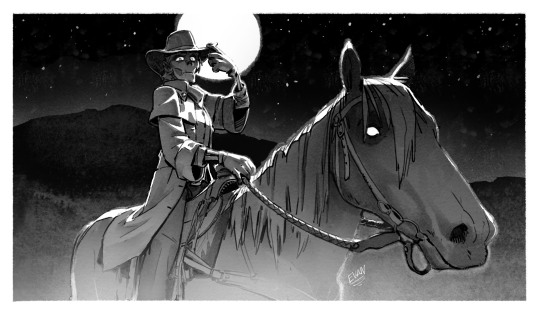
CHARLEY PARKHEARSE
Once, long ago, Charley was the best teamster in Santa Alma county. His stagecoach flew over treacherous mountain roads, One crack of his whip could snuff a candle’s flame from six yards, and any bandit who dared to stop his stage would meet the business end of a rifle. Anyone who cared to comment about his sour temper or murky past knew to keep their voices low… and God help any fool who questioned Charley’s refusal to remove his heavy greatcoat, no matter the weather.
But Charley’s fame was bound to earn him enemies… When the bandit Sugarfoot learned that Charley was in fact born a █████, the secret spread like wildfire through the mountains. Charley was ruined. He thought his life was over, until he was visited by a being dealing in black magic; a devil known in his human guise as Aurelius Flood. This devil promised to erase Charley’s secret from the minds of Santa Alma’s people, restoring Charley’s reputation, in return for his soul. Charley accepted, though he would not learn the depth of his folly until the night he died… and was raised as a ghost by that same devil, now bound to his service. Still, the devil was true to his word. Charley’s secret was safe, even beyond the grave.
At one point in the many decades since his death, Charley thought he could escape Aurelius’ control. But today… he’s given up that hope. He haunts the roads he was once the master of, frightening drivers to meet his quota of Soul and waiting ‘till his memories fade away, taking the pain of his mistakes with them. That is until, in a flash of ill-advised mercy, Charley spares the life of a young woman he scared off the road…
(Charley is LOOSELY based on Charley Darkey Parkhurst, a real historical figure. Look him up! He's a really cool example of a queer, probably trans person ((by today's standards)) in history. The real Charley's dying wish was to be remembered as a man; a wish that has not been respected by history. I want to explore the pros and cons of living closeted or stealth in an ever-changing world, while also honoring his memory and wishes as best I can in a modern context.)

SEQUOIA LOGANBERRY
Sequoia would like you to believe that she is a monster. It’s easier that way. Ever since her father left for a mistress on the east coast in her senior year of high school, Sequoia has been working a dead-end job at the local amusement park and doing her damndest to drink and drive herself into an early grave. And she almost does it… Until a friggin' SKELETON GUY fishes her out of the lake she drove into?! And now she’s getting these insane migraines and seeing spooky shit everywhere????
After a close encounter with death (and Charley), Sequoia develops an unpredictable 6th sense that threatens to finish what she started in her car the other night… Until she’s found by the misanthropic wizard Monty and his much nicer siren husband Luka, who help her get her new powers under control… in trade for her helping them with a few odd jobs. Nothing crazy, just, oh, infiltrating the local magical crime lord’s fey court. Sequoia is just the wild card they need to break a fifty-year standoff between the supernatural powers vying for control over Santa Alma. Sequoia will need to learn fast, about both magic and herself, or else end up a pawn in other people’s plans. Will she be able to make the friends she desperately needs and find direction in her life before she’s swept away?
OTHER CHARACTERS INCLUDE...
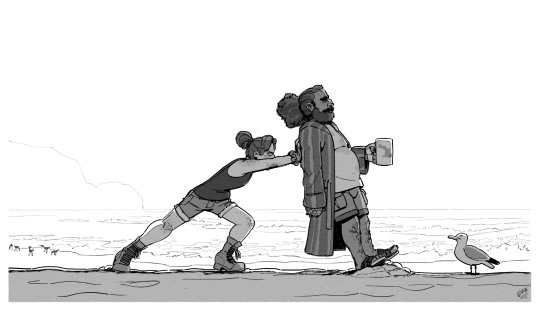
MONTY MOUROS, aforementioned misanthropic wizard. Older than he looks. Came to Santa Alma in the 1930’s to earn his fortune, and ended up embroiled in one of Charley’s bids for freedom. It didn’t go well, and he still holds a bitter grudge. He’s guarded the local amusement park, the Boardwalk, from Aurelius Flood for years, but other than that has hidden himself from both the magic and mundane worlds for decades.
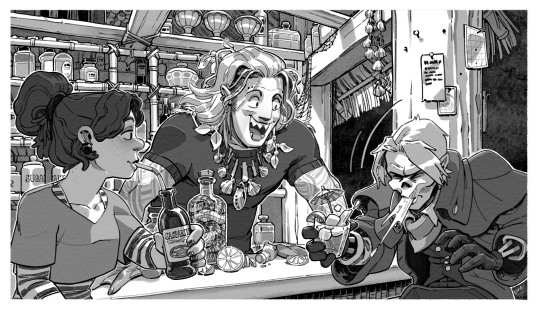
LUKA, a siren who lost his singing voice in a trap set by Flood. If not for Monty, it would have taken his life. When they were young the two fell in love, and Luka defied his family’s traditions to be with Monty. They’re still together, and Luka is the only person who can get past Monty’s harsh exterior. Luka now runs a speakeasy for spirits hidden beneath the Boardwalk, where he mixes magical cocktails and turns the rumor mill. He is a kind soul who defines himself through service to others…perhaps to a fault.
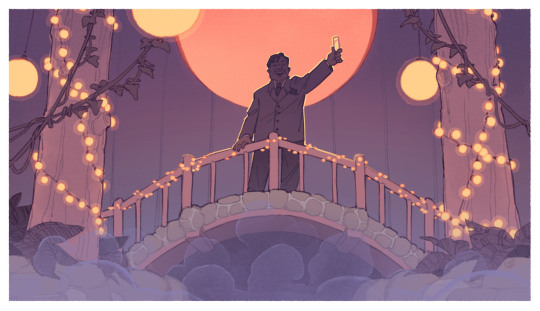
AURELIUS FLOOD, The mastermind behind most of Santa Alma’s woes. A cruelly ambitious leprechaun who thrives on greed, he’s been following the money since the time of the Romans. In the 1800’s he came to the new world, where he found fabulous opportunity during the California gold rush. Assuming a human disguise he carved out a business empire in the mundane world, and a criminal one in the magic world. He built Santa Alma himself, engineering the city’s growth. Fattening a pig for the slaughter. Now, the only thing standing between him and his ultimate payday is Monty and the pivotal bit of territory he controls at the Boardwalk. It’s stymied him for years, but he’s got a new plan…
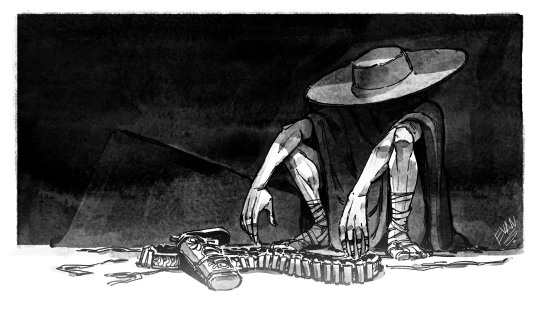
SUGARFOOT, Flood’s left-hand man. As the illegitimate son of a powerful Californio rancher and an Ohlone woman trapped in the California mission system, fate did not deal Sugar a kind hand. After his father’s family lost their rancho, Sugar turned to a life of crime. He got his sarcastic nickname from a festering leg wound he earned in a shootout with Santa Alma’s top teamster, Charley Parkhearse. As his infection grew, so did his hatred… These mountains should belong to him, not some johnny-come-lately from New Hampshire. So he turned to another stranger for help; Aurelius Flood. In trade for his soul, he gained information; a secret that, if it were to get out, would ruin Charley forever. Sugar leapt at the deal, and got exactly the revenge he’d wanted… until Charley came for him, blinded by rage and shame, and shot him dead in the street. In death, Sugar and Charley found themselves in the same situation… bound to serve Flood forever. As coworkers. Hell would have been a mercy.
(Sugarfoot is also based on a historical figure of the same name, but almost nothing is known about him other than he was a bandit with a very stinky foot. IRL Charley shot him when he tried to raid his stagecoach.)
ZINNIA LOGANBERRY, Sequoia’s annoyingly precocious little sister. While Sequoia turned to delinquency after their parents’ divorce to avoid her feelings, Zinnia threw herself into her studies for the same reason. She has become the model student and daughter, earning their workaholic mom’s favor… but man, this kid is Burnt. Out. When she finds out about Sequoia’s new adventures with the supernatural, she throws herself into this new world as a release from her demanding daily life only to once again take things too far. And now, the consequences come with fangs, and hair, and claws…
DEBORAH LOGANBERRY, Sequoia and Zinnia’s mother. She knows she could be doing better by her daughters, but ever since her no-good husband left them, she’s been the family’s sole provider. Her job in the city’s planning and zoning department is the only thing keeping them off of the streets, and the price of housing in Santa Alma is only going up. It’s a matter of survival; surely, once they’re more financially stable, she’ll be able to patch things up with Sequoia. And maybe something will come of the new friendship she’s struck up with Mr. Flood. He IS quite the successful developer, after all… perhaps they could be more than friends?
#follow up questions are welcome#Ensouled#Charley Parkhearse#Sequoia Loganberry#Zinnia Loganberry#Monty Mouros#Luka Pharos#Sugarfoot#Aurelius Flood#Deborah Loganberry#don't have any good pictures of zinnie or deborah sorryyyy#also sugar and flood's proper designs are still very much WIPs
213 notes
·
View notes
Text
[ID: a screenshot of a reply by yuri-alexseygaybitch that reads, "Can you explain?" End ID.]
the historical source we have for understanding much of the early roman empire are so fucking bad. like whenever you hear any insane story about tiberius/caligula/nero/commodus/elagabalus imagine trying to put together an account of any modern figure if your only avaiable sources were tucker carlson archives and the daily mail
#THIS EXACTLY#like i get the desire to look for people who share our identities in history and queer people have always existed#but also. when queer historians say stuff like “we cant apply modern identities to the past'' what they MEAN is#that what we think of as “gay'' hasnt always meant the same thing throughout time#queer people have Always existed but not always in the same exact way and its#even as recently as in the early 20th century! like sure maybe a lot of drag queens at stonewall would call themselves trans women Now#but theres no real way to know that! and it gets worse into antiquity#we talked about this in my queer biblical studies class a Lot and one of the things i took away from that class#was theres nothing wrong with saying “this person seems to have an identity that i connect to and i see myself in them''#but you cant always definitively say “this person was gay/trans/bi/queer''#and for me thats the fun part about queer historical work :)#queer people have always existed but not always in the same way#and its our job as historical interpreters to figure out the contexts they lived in and its Fun to do that
6K notes
·
View notes
Text
youtube
Recovering the Queer History of Britain’s Navy in the Age of Sail
5 notes
·
View notes
Text
PODCAST RECS - Debunking and Fact-Checking for Witches & Witchcraft Spaces
A collection of podcast episodes fact-checking, debunking, or just providing some clarity on modern myths, misinformation, and conspiracy theories that are frequent flyers in witchcraft and pagan spaces, both theories mistakenly touted by community members and some of the utter drivel spouted by non-witches that still affects us today. Check out these shows on your favorite podcast app!
(Updates to be made whenever I find new content. There will be some crossover with my Witches In History Podcast Recs post and some of the content will be heavy. Blanket trigger warning for violence, abuse, bigotry, sexism, antisemitism, and mistreatment of women, queer people, and children.)
[Last Updated: October 17, 2024]
This post is broken into three basic sections:
Historical Misinformation
Modern Myths and the People Who Create Them
Conspiracy Theories and Moral Panics
List of Cited Podcasts, in alphabetical order
American Hysteria
BS-Free Witchcraft
Dig: A History Podcast
Hex Positive
Historical Blindness
History Uncovered
Morbid
Occultae Veritatis
Our Curious Past
Our Fake History
Ridiculous History
Stuff You Missed In History Class
The History of Witchcraft
Unobscured
You’re Wrong About…
Historical Misinformation
General History of Witchcraft
Historical Blindness - A Rediscovery of Witches, Pt 1 & 2 Oct 13, 2020 & Oct. 27, 2020 A discussion of the early modern witch craze and the myths, misconceptions, and theories about witches spread by academics. Topics of discussion include the works of Margaret Murray and Charles Leland, the founding of Wicca, the emergence of the midwife-witch myth, and folk healers as targets of witchcraft accusations. Sarah Handley-Cousins of “Dig: A History Podcast” supplies guest material for both episodes.
Hex Positive, Ep. 36 - Margaret Effing Murray with Trae Dorn July 1, 2023 Margaret Murray was a celebrated author, historian, folklorist, Egyptologist, archaeologist, anthropologist, first-wave feminist, and the first woman to be appointed to the position of lecturer in archaeology in the UK. So why so we get so annoyed whenever her name is mentioned in conversations about witchcraft? Well, it all has to do with a book Margaret wrote back in 1921...which just so happened to go on to have a profound influence on the roots of the modern witchcraft movement.
Nerd & Tie senpai and host of BS-Free Witchcraft Trae Dorn joins Bree NicGarran in the virtual studio to discuss the thoroughly-discredited witch-cult hypothesis, Murray's various writings and accomplishments, and why modern paganism might not have caught on so strongly without her.
BS-Free Witchcraft, Ep 03: The History of Wicca October 06, 2018 On this episode, Trae digs deep into the history of Wicca, and tries to give the most accurate history of the religion as they can. I mean, yeah, we know this is a general Witchcraft podcast, but Wicca is the most widely practiced form of Witchcraft in the US, UK, Canada and Australia… so how it got started is kind of important for the modern Witchcraft movement. (And trust me, there aren’t any pulled punches here.)
BS-Free Witchcraft, Ep. 28: The Burning Times May 30, 2020 On this installment of the podcast, we tackle probably one of the more controversial topics in the modern witchcraft movement: The Burning Times. What were the actual “Burning Times,” where do we get that phrase from, and what really happened? Also, how has this phrase been used in modern witchcraft? It’s a heavy one, folks.
Dig: A History Podcast - Both Man and Witch: Uncovering the Invisible History of Male Witches Sept 13, 2020 Since at least the 1970s, academic histories of witches and witchcraft have enjoyed a rare level of visibility in popular culture. Feminist, literary, and historical scholarship about witches has shaped popular culture to such a degree that the discipline has become more about unlearning everything we thought we knew about witches. Though historians have continued to investigate and re-interpret witch history, the general public remains fixated on the compelling, feminist narrative of the vulnerable women hanged and burned at the stake for upsetting the patriarchy. While this part of the story can be true, especially in certain contexts, it’s only part of the story, and frankly, not even the most interesting part. Today, we tackle male witches in early modern Eurasia and North America!
Dig: A History Podcast - Doctor, Healer, Midwife, Witch: How the the Women’s Health Movement Created the Myth of the Midwife-Witch Sept 6, 2020 In 1973, two professors active in the women’s health movement wrote a pamphlet for women to read in the consciousness-raising reading groups. The pamphlet, inspired by Our Bodies, Ourselves, looked to history to explain how women had been marginalized in their own healthcare. Women used to be an important part of the medical profession as midwives, they argued — but the midwives were forced out of practice because they were so often considered witches and persecuted by the patriarchy in the form of the Catholic Church. The idea that midwives were regularly accused of witchcraft seemed so obvious that it quickly became taken as fact. There was only one problem: it wasn’t true. In this episode, we follow the convoluted origin story of the myth of the midwife-witch.
Dig: A History Podcast - Cheesecloth, Spiritualism, and State Secrets: Helen Duncan’s Famous Witchcraft Trial July 3, 2022 Helen Duncan was charged under the 1735 Witchcraft Act, but her case was no eighteenth-century sensation: she was arrested, charged, and ultimately imprisoned in 1944. Of course, in 1944, Britain was at war, fighting fascism by day on the continent and hiding in air raid shelters by night at home. The spectacle of a Spiritualist medium on trial for witchcraft seemed out of place. What possessed the Home Secretary to allow this trial to make headlines all across the UK in 1944? That’s what we’re here to find out.
The Conspirators, Ep. 63 - The Last Witch Trial Nov. 26, 2017 England’s official laws regarding the prosecution of witches dates back to the 1600s. Those very same laws would also remain on the books until well into the 20th century. In 1944, a psychic medium named Helen Duncan would gain notoriety by becoming the last woman to be tried under England’s witchcraft laws.
The History of Witchcraft Podcast, hosted by Samuel Hume Witches didn’t exist, and yet thousands of people were executed for the crime of witchcraft. Why? The belief in magic and witchcraft has existed in every recorded human culture; this podcast looks at how people explained the inexplicable, turned random acts of nature into conscious acts of mortal or supernatural beings, and how desperate communities took revenge against the suspected perpetrators.
Unobscured, Season One - The Salem Witch Trials Welcome to Salem, Massachusetts. It’s 1692. And all hell is about to break loose.
Unobscured is a deep-dive history podcast from the labs of How Stuff Works, featuring the writing and narrative talents of Aaron Mahnke, horror novelist and the mind behind Lore and Cabinet of Curiosities.
As with his other series, Mahnke approaches the events in Salem armed with a mountain of research. Interviews with prominent historians add depth and documentation to each episode. And it’s not just the trials you’ll learn about; it’s the stories of the people, places, attitudes, and conflicts that led to the deaths of more than twenty innocent people.
Each week, a new aspect of the story is explored, gradually weaving events and personalities together in chronological order to create a perspective of the trials that is both expansive and intimate. From Bridget Bishop to Cotton Mather, from Andover to Salem Town, Mahkne digs deep to uncover the truth behind the most notorious witch trials in American history.
Think you know the story of Salem? Think again.
Witchcraft and Other Magical Practices
BS-Free Witchcraft, Ep. 43 - “Lilith” Jan. 29, 2022 Host Trae Dorn discusses the ongoing debate over whether or not it’s okay for non-Jewish witches to incorporate Lilith into their practices. Is Lilith closed? Is it cultural appropriation? There’s so much misinformation in New Age and poorly written witchcraft books on Lilith, it’s hard for some witches to get a clear picture. It’s common to run into folks on social media talking about Lilith as a “Goddess,” which she very much isn’t. Let’s dive into the origins of the folklore surrounding this figure, and we’ll let you decide whether or not it’s okay to work with Lilith. But, uh, spoiler – we don’t think you should.
Historical Blindness, Ep. 106 - Lilith, the Phantom Maiden November 22, 2022 Host Nathaniel Lloyd explores the evolution of the figure of Lilith, from Mesopotamian demon, to the first woman created by God, and back to a succubus mother of demons. It’s a tale of syncretism, superstition, forgery, and a dubious interpretation of scriptures.
BS-Free Witchcraft, Ep. 55 - Lucky Girl Syndrome and the Law of Attraction January 28, 2023 Trae takes a look at one of New Age spirituality’s most toxic philosophies - The Law of Attraction. The history of the idea is discussed, where it came from, and how this dangerous combination of prosperity gospel, purity culture, and victim-blaming has come back in a major way to a whole new generation as “Lucky Girl Syndrome.”
Hex Positive, Ep. 19 - The Trouble with Tarot August 1, 2021 Tarot and tarot-reading have been a part of the modern witchcraft movement since the 1960s. But where did these cards and their meanings come from? Are they secretly Ancient Egyptian mystical texts? Do they have their origins among the Romani people? Are they a sacred closed practice that should not be used by outsiders? Nope, nope, and nope.
This month, we delve into the actual history of tarot cards, discover their origins on the gaming tables of Italy and France, meet the people who developed their imagery and symbolism into the deck we know today, and debunk some of the nonsense that’s been going around lately concerning their use. The Witchstorian is putting on her research specs for this one!
Stuff You Missed in History Class - A Brief History of Tarot Cards Oct. 26, 2020 How did a card game gain a reputation for being connected to mysticism? Tarot’s history takes a significant turn in the 18th century, but much of that shift in perception is based on one author’s suppositions and theories.
Hex Positive, Ep. 23 - The Name of the Game November 1, 2021 Bree delves into the history, myths, and urban legends surrounding Ouija boards. Along the way, we’ll uncover their origins in the spiritualist movement, discover the pop culture phenomenon that labeled them portals to hell, and try to separate fact from internet fiction with regard to what these talking boards can actually do.
Our Curious Past, Ep. 20 - The Curious History of the Ouija Board August 18, 2023 Host Peter Laws explores the history of the “talking board,” which was wildly popular in the early 1900s, until something happened that would tarnish its’ reputation for good.
Ridiculous History - Brooms and Witchcraft, Pt. 1 & 2 Oct. 13-15, 2020 Most people are familiar with the stereotypical image of a witch: a haggard, often older individual with a peaked hat, black robes, a demonic familiar and, oddly enough, a penchant for cruising around on broomsticks. But where did that last weirdly specific trop of flying on a broomstick actually come from? Could the stereotype of witches on broomsticks actually be a drug reference? Join Ben, Noel, and Casey as they continue digging through the history and folklore of witchcraft - and how it affected pop culture in the modern day.
Historical Blindness, Ep. 116 - The Key to the Secrets of King Solomon May 02, 2023 Host Nathaniel Lloyd continues his occasional series on the history and mythology of magic. In this installment, he looks at the development of the story that the biblical King Solomon was actually a flying-carpet-riding, magic-ring-wielding wizard and alchemist who bound demons to do his will. The origins and content of the legendary Key of Solomon are also discussed.
Dig: A History Podcast - Plastic Shamans and Spiritual Hucksters: A History of Peddling and Protecting Native American Spirituality July 24, 2022 In the late 20th century, white Americans flocked to New Age spirituality, collecting crystals, hugging trees, and finding their places in the great Medicine Wheel. Many didn’t realize - or didn’t care - that much of this spirituality was based on the spiritual faiths and practices of Native American tribes. Frustrated with what they called “spiritual hucksterism,” members of the American Indian Movement (AIM) began protesting - and have never stopped. Who were these “plastic shamans,” and how did the spiritual services they sold become so popular?
Historical Blindness, Ep. 145 - All Is Number: Pythagoras and Numerology May 28, 2024 In this installment of the ongoing Encyclopedia Grimoria series, host Nathaniel Lloyd talks about a cult leader who is remembered as a great mathematician, whose real lasting contribution to the world is the nonsensical divination "magic" known as numerology.
Holidays
Hex Positive, Ep. 28 - The Easter-Ostara Debacle April 1, 2022 Host Bree NicGarran puts on her Witchstorian hat once more to delve into the origins of both Easter and Ostara and to finally answer the age-old question: which came first – the bunny or the egg?
Historical Blindness, Ep. 28 - A Very Historically Blind Christmas Dec. 18, 2018 An exploration of the origins of Christmas traditions, with special guest Brian Earl of the Christmas Past podcast. (There is also some mention of Christmas witches!) Further installments of this series explore additional Christmas traditions and iconography which have been falsely claimed to have pagan origins as well as the myths surrounding the history of Christmas itself. (Eps. 47, 63, 84, & 132 in December of subsequent years)
Modern Myths and the People Who Create Them
Ed and Lorraine Warren
You’re Wrong About…Ed and Lorraine Warren w. Jamie Loftus Nov 8 2021 Special Guest Jamie Loftus tells Sarah about Ed and Lorraine Warren (of The Conjuring and Annabelle fame). Topics of interest include Connecticut as a locus of scary happenings, New England uncles, and psychic communication with a tearstained Bigfoot.
Dig: A History Podcast - The Demonologist and the Clairvoyant: Ed and Lorraine Warren, Paranormal Investigation, and Exorcism in the Modern World Oct 3 2021 In the 1970s, Lorraine and Ed Warren had a spotlight of paranormal obsession shining on them. In the last decade, their work as paranormal investigators–ghost hunters–has been the premise for a blockbuster horror franchise totaling at least seven films so far, and more planned in the near future. So… what the heck? Is this for real? Yes, friends, today we’re talking about demonology, psychic connections to the dead, and the patriarchy. Just a typical day with your historians at Dig.
History Uncovered, Ep. 92 - The Enfield Haunting That Inspired "The Conjuring 2" Oct 25 2023 The Enfield Haunting began with a bang. Literally. From 1977 to 1979, an unassuming North London home was the site of near-constant paranormal activity, from knocking sounds and moving objects to disembodied voices and the terrifying alleged possession of one young daughter of the Hodgson family. But how much truth was there to these happenings? And since the Warrens got involved briefly and subsequently touted themselves as experts on the case (and made money from talking about it), how much of what we think we know reflects the actual events?
Hex Positive, Ep. 042 - Extended Warren Tea with Jenn the Ouija Girl and Lorelei Rivers Jan 01 2024 Discussions about the careers and rhetoric of the Warrens make the rounds regularly in conversations about the paranormal among members of the witchcraft community. But who were the Warrens? Why do they inspire such ire even as the Conjuring franchise gains steam? How much of what we think we know about the supernatural comes from them? And why is it important to recognize - and refute - their rhetoric when we encounter it? Bree NicGarran sits down with Jenn the Ouija Girl and Lorelei Rivers to spill ALL the tea.
"Paranormal" Literature & Media
You’re Wrong About…Winter Book Club - The Amityville Horror, Pts. 1-3 Dec 20 2021 - Feb 6 2022 Sarah tells guest host Jamie Loftus about the Amityville Horror, how it’s a Christmas story, and buying murder furniture might not be such a great idea. Further highlights include Jodie the Demon Pig, poor insulation and terrible parenting as evidence of a haunting, lots and lots of sunk cost fallacy, and how the book kind of debunks itself.
MORBID, Ep. 610 - The Amityville Horror Conspiracy October 17 2024 The supposed experience of the Lutz family at 112 Ocean Avenue served as the basis for the iconic haunted house story, “The Amityville Horror,” and the countless films adapted from or inspired by the original novel. However, unlike most other stories of paranormal experiences, “The Amityville Horror” became a phenomenon that influenced everything from Ronald DeFeo’s criminal defense during his murder trial to the American public’s belief in the supernatural. Yet for all their talk of it being a genuine story of demonic activity, in the years since the publication of the popular novel, a large body of evidence from skeptical evaluations to court records and interview transcripts suggest that America’s most notorious haunted house might not have been quite so haunted after all.
American Hysteria, Ep. 125 - I Was A Teenage Poltergeist October 14 2024 Sarah Marshall, host of “You’re Wrong About…,” transports us to the old world of British Hysteria to reveal the mysterious story of the Enfield Poltergeist and joins host Chelsea Weber Smith at the seance table to discuss the great unknown and the ghosts they know.
You’re Wrong About… - Michelle Remembers, Pt. 1-5 March 26, 2020 - April 30, 2020 Intrepid hosts Sarah and Mike delve into one of the foundational texts of the Satanic Panic - “Michelle Remembers.” A young woman spends a year undergoing hypnosis therapy, which uncovers repressed memories of shocking and horrifying abuse at the hands of a Satanic cult. The book became a foundational text for both mental health professionals and law enforcement attempting to grapple with an alleged nationwide network of insidiously invisible child-abducting cults. The only problem is…none of what Michelle remembered ever actually happened.
You’re Wrong About…. - The Satan Seller, Pt. 1-5 June 28, 2021 - August 9, 2021 Sarah and Mike return to Camp You’re Wrong About for another Satanic Panic story hour. This time, the summer book club explores Mike Warnke’s 1972 “memoir” about joining a demonic cult, rising through the ranks of Satan’s favorite lackeys, his sudden downfall and redemption, and the California hedonism that made him do it. This is followed by a discussion of the Cornerstone Magazine exposé that brought the facts to light and thoroughly discredited Warnke’s story.
American Hysteria, Eps. 64-66 - Chick Tracts, Pts. 1-3 March 20 - April 03, 2023 In his own lifetime, Jack Chick was one of most prolific and widely-read comic artists in history. His company, Chick Tracts, published hundreds of millions of copies of pocket-sized bible comics, filled with lurid illustrations of cackling demons, wicked witches, and sinister cults, all hell-bent on corrupting any hapless mortal they could get their hands on. These tracts were meant to be left where they might be found by a sinner in need of salvation, with a scared-straight morality-play approach to Christianity that contributed in no small part to the period in the late 20th century we now call the Satanic Panic. (There’s also a follow-up two-part episode about one of Chick’s “occult experts,” who claimed to be, among other things, a real-life vampire.)
History Uncovered, Ep. 95 - Roland Doe, The Boy Who Inspired "The Exorcist" November 15, 2023 In 1949, priests performed an exorcism on a boy referred to as "Roland Doe," aka Ronald Hunkeler, in a chilling ordeal that became the real-life inspiration for William Peter Blatty's 1971 book, "The Exorcist," and the movie adaptation released in 1973. But what really happened during this alleged exorcism and was there any proof of the claims of alleged demonic paranormal activity surrounding the events?
You're Wrong About... - The Exorcist (with Marlena Williams) December 27, 2023 Marlena Williams, author of "Night Mother: A Personal and Cultural History of the Exorcist," joins host Sarah Marshall to discuss the little possession movie that changed America forever. Was the set cursed by Satan himself, or plain old 70s misogyny? What makes a country going through a cultural upheaval embrace stories about the Devil? And - the most critical question of all - do Ouija boards really cause possession?
Frightful, Bonus Episode - Is the Paranormal Like A New Religion? June 25 2024 Since the early 2000s, paranormal content has exploded in popular culture. It seems we can't get enough of ghosts (and hunting for them). What could be behind this enthusiasm for spooky things? Host Peter Laws shares a theory - that the paranormal is a clever way for us to be religious...without being religious. (This is less a debunking than a discussion of a personal hypothesis, but it deals with the pervasiveness of cultural religious themes, the influence of social media on modern mythmaking, and the sense of community surrounding paranormal belief.)
Conspiracy Theories and Moral Panics
Ancient "Mysteries"
Historical Blindness, Pyramidiocy, Eps. 146-151 June-July 2024 Host Nathaniel Lloyd delves into the great pyramids and the various myths and misconceptions surrounding them, some of which, despite vast amounts of historical evidence to the contrary, endure to this very day. Further related segments on this topic may be found on the show's Patreon, including a highly interesting July 2024 minisode regarding "Books of the Dead," which examines claims about H.P. Lovecraft's "Necronomicon" and its' supposed relation to the Egyptian Book of the Dead and the Emerald Tablet of Hermes Trismegistus.
History Uncovered, Ep. 117 - The Real History Behind the Mythic City of Atlantis June 12, 2024 First mentioned by Plato in Timaeus and Critias, the lost city of Atlantis later became a widely debated topic among historians. But is Atlantis real? (Spoiler: No. No it is not.)
Hucksters, Secret Societies, and Antisemitism
Historical Blindness, Ep. 14 - Bloody Libel December 12, 2017 An exploration of one of the most destructive myths in history - the blood libel, or the false accusation that Jews of the Middle Ages and beyond ritually murdered Christian children, a lie that host Nathaniel Lloyd traces back to its’ roots in medieval England and the murder of one Young William of Norwich.
Historical Blindness, Eps. 56-57 - The Illuminati Illuminated September 15-29, 2020 A contemplation of the modern conservative conspiracy theory of a “deep state” leads host Nathaniel Lloyd back to the dawn of the modern conspiracy theory, the Enlightenment, when the ultimate conservative conspiracy theory was born as an explanation for the French Revolution: The Illuminati!
Historical Blindness, Eps. 38-40 - Nazi Occultism, Parts 1-3 July 2-30, 2019 An exploration of the dark roots of Nazi occult philosophies, from a neo-paganism preoccupied with the Nordic Pantheon, to a folksy back-to-the-land movement that evolved into a nationalist sentiment, to an ideology of racial supremacy all tied up with contemporary myths and pseudoscience. (The host is careful to note with clarity and vehemence at the start of each episode that this series IN NO WAY approves of, promotes, or supports this ideology and Nazism is roundly condemned at every turn. It’s not an easy listen, but understanding how and why this bigotry continues to be a problem in pagan spaces and how to recognize it is very important.) TL;DR - Fuck Nazis. No tolerance for genocidal fuckwads.
DIG: A History Podcast - Werewolves, Vampires, and the Aryans of Ancient Atlantis: The Occultic Roots of the Nazi Party Oct 17, 2021 Modern movie plotlines which portray Nazi obsessions with occultism might be exaggerated for dramatic effect, but they aren't made up out of wholecloth. The NSDAP, or the National Socialist Worker's Party, was a party ideologically enabled by occultist theories about the Aryan race and vampiric Jews, on old folk tales about secret vigilante courts and nationalist werewolves, and on pseudoscientific ideas about ice moons. In this episode, the hosts explore the occult ideas, racial mythology, and 'supernatural imaginary' that helped to create the Nazi Party.
Our Fake History, Eps. 66-68: Who Was the Mother of the Occult? May-June 2018 An exploration of the life and works of Helena Petrovna Blavatsky, self-described sage, medium, guru, author, and one of the founders of Theosophy.
The Satanic Panic
American Hysteria - Satanic Panic, pt 1 & 2 Dec. 10 2018 - Jan. 07, 2019 This two-part episode covers perhaps the most mystifying moral panic in US history, the 1980s and early 90s ‘Satanic Panic.’ For this episode, Chelsey covers the rise of organized Satanism beginning in the late 60s, as well as the adversarial countercultures of the hippies and the metalheads, and their apparent Satanic crimes that would be hailed as proof of their evil, as well as proof that teens, as well as children, were in serious moral peril. Satan was allegedly hypnotizing the youth with secret messages in backwards rock songs, teaching them occult magic in Saturday morning cartoons, and causing suicides through a popular role-playing games, all while helping religion blur into politics for good.
For part two, Chelsey will cover what came next, a serious investigation into an imagined network of Satanic cults ritually abusing children in daycare centers all over the country. Chelsey will try to understand this shocking decade in history, why it really happened, and the cultural issues it was really about.
BS-Free Witchcraft, Ep 10 - The Satanic Panic April 27, 2019 The Satanic Panic of the 70s, 80s, and 90s shaped the Modern Witchcraft Movement in a lot of unexpected ways. Its effects still ripple through a lot of our sources, so in this installment of the podcast we’re digging into this extremely weird part of American history. It’s a bit of a doozy, after all.
BS-Free Witchcraft - Ep. 32: A New Satanic Panic? February 27, 2021 A couple of years ago, we did an episode on the history of the Satanic Panic of the latter half of the twentieth century, but recent events have led us to ask - could it be happening again? It’s very possible that we are at the start of a new wave of satanic panic, and QAnon is just the latest symptom of a larger problem.
Occultae Veritatis, Case #014: Satanic Panic of Martensville Jan. 28, 2018 Today the hosts cover one of the various Satanic ritual abuse scandals that happened close to them. Is it full of hot air and false allegations? Yes. Yes it is.
Occultae Veritatis, Case #097A & B: Dungeons, Dragons, and the Satanic Panic Dec. 07, 2019 - Dec. 15, 2019 Dungeons & Dragons, introduced in 1974, attracted millions of players, along with accusations by some religious figures that the game fostered demon worship and a belief in witchcraft and magic.
[Last Updated: October 17 2024]
1K notes
·
View notes
Note
I'm sorry if I'm bothering you, but I'm just so curious about this. One time I watched this video of a map that depicted the rights and legality of homosexuality since 1790s, and according to the map, homosexuality was not illegal/remained de criminalized in Napoleonic France. I also saw a site that talked about history of rights of homosexuality that says the same thing and that The Napoleonic code influenced South American countries to also de criminalize homosexuality. Is this true? I mean I know that It's not our modern way of viewing sexuality and that we shouldn't look at it that way, but was it really not illegal? Again, sorry If I'm bothering you I'm just curious
Yeah! That's more or less the gist of it.
The decriminalization of sodomy occurred in 1791, during the French Revolution, as an unintended benefit of the secularization of state laws.
The Penal Code of 1791 specifically avoided outlawing anything that was deemed a crime due to "superstition [i.e., Christianity], feudalism, the tax system, and [royal] despotism" (to quote Saint-Fargeau who crafted the 1791 Code). Therefore things that weren't penalized anymore included same-sex acts also heresy, blasphemy, witchcraft, sacrilege, incest, bestiality and so on. Because all those fell under the purview of Church-influenced civil law and the goal was to entirely divorce Church and State.
Also, most Enlightenment philosophers and politicians may have viewed sodomy and same-sex acts as vile and contemptable, but they were of the mind that the state has no business interfering in the private lives of citizens (a sentiment that has carried forward well into modern day - see: Pierre Trudeau's famous 1967 line defending Canada's decriminalization of abortion, homosexuality and divorce: " [there is] no place for the state in the bedrooms of the nation.")
(The demarcation of where sodomy fell when it came to who punished it - ecclesiastical or secular courts - varied state by state. More often than not, by the early modern period, it was handled in secular courts though the punishment could still be execution by burning [e.g., Venice] which, I would argue, is a clear left-over from when it was handled by the Church.)
The 1810 Penal Code of Napoleonic France while harsher in some respects compared to the 1791 Code, it did maintain silence on same-sex acts therefore continuing the decriminalization of sodomy.
That said, men who had sex with men were harassed by police and the state through other measures in France, no matter the status of the decriminalization - including during the Revolution on through Napoleonic France to modern day. They just couldn't be taken to court and punished for it. (Public Indecency laws and Loitering laws were used as a means to punish those who engaged in same-sex acts as a sort of "back door" [hurhur] to criminalizing them. These laws also allowed unofficial criminalization of houseless peoples, Romani, sex-workers, and others deemed "undesirable" by the current mores of society.)
So yeah, since 1791 in France homosexuality, as we would term, was decriminalized.
(Hence why Oscar Wilde left England for France after he was released from prison in 1897.)
--
thank you for the ask! and you were no bother at all :)
#ask#history#queer history#napoleonic#early modern history#18th century#19th century#reply#anon#lgbtq+ history#napoleonic era#french revolution
22 notes
·
View notes